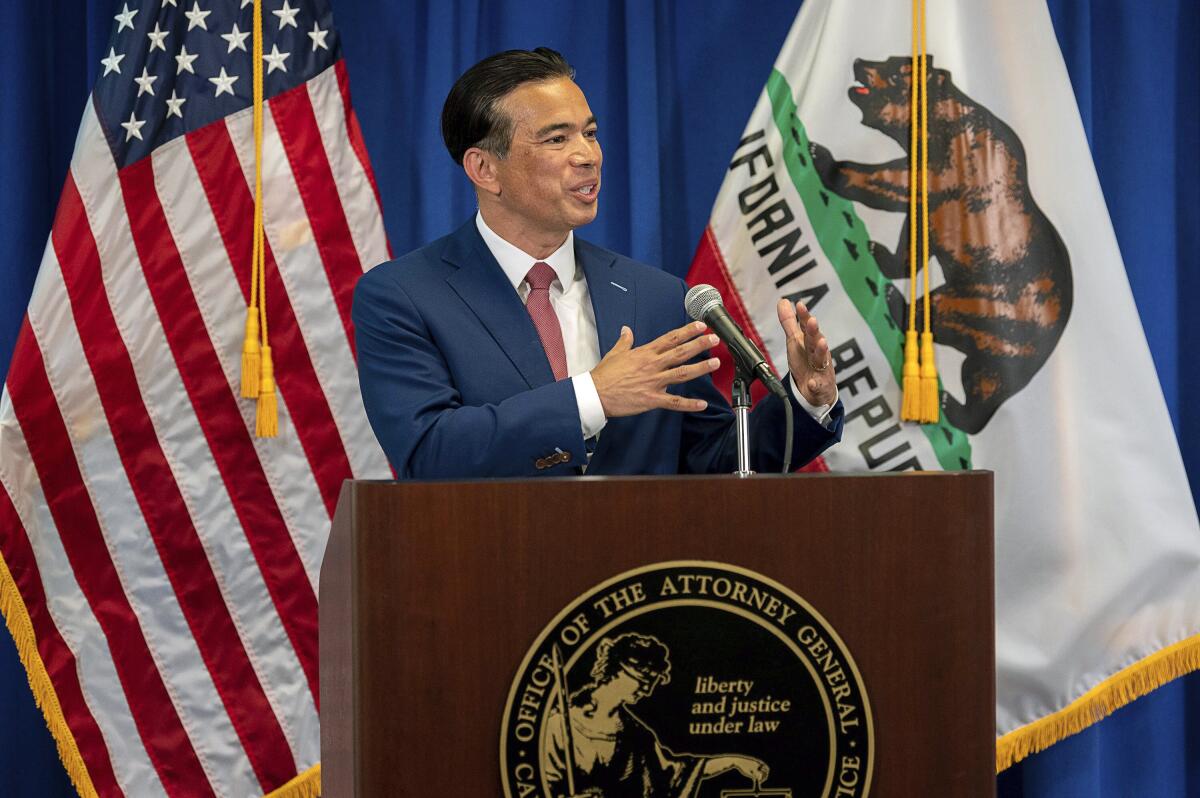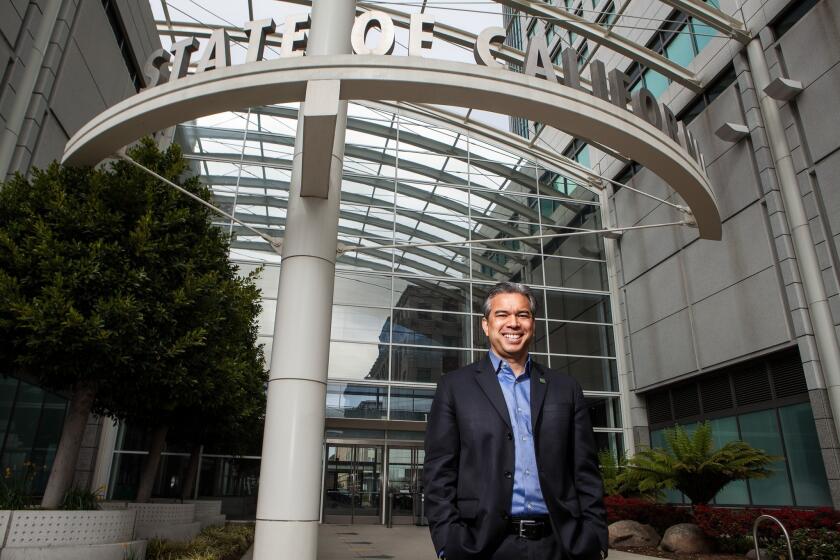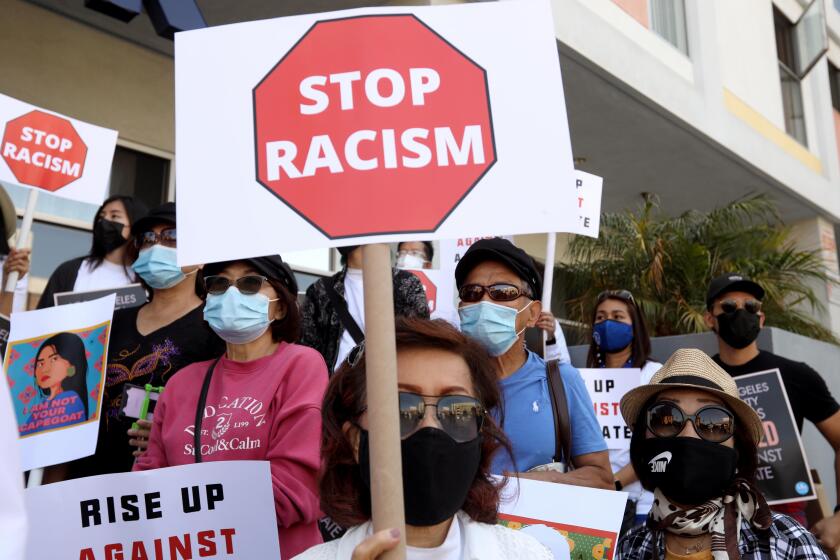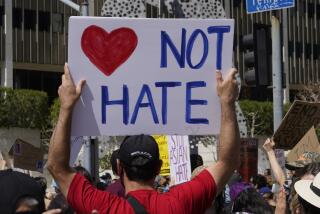California attorney general launches racial justice bureau to combat hate crimes, police bias

California Atty. Gen. Rob Bonta will create a racial justice bureau to combat white supremacy and biased policing as well as to explore the possibility of reparations for slavery.
Bonta unveiled plans for the bureau on Tuesday in his first news conference since assuming the post last month.
“All of our communities deserve to to be valued, to be protected,” he said.
The announcement comes at a time when police killings of Black people around the country have led to street protests and demands for change. It also emerges during a COVID-19 pandemic where Asian Americans have increasingly been attacked, both verbally and physically, in part because of the mistaken belief that they brought the coronavirus to this country.
“Taking on hate crimes will always be one of my top priorities as the people’s attorney,” said Bonta, the first Filipino American to hold the job. “No part of California is immune to hate.”
Tackling numerous outstanding tasks could make it more difficult for Rob Bonta to pursue his own ambitious criminal justice reform agenda in the coming months.
The new bureau will be staffed with six attorneys and a supervising deputy attorney general, who will work closely with community groups as well as law enforcement.
It will focus on four elements, Bonta said — taking on white supremacy and hate organizations; examining implicit and explicit bias in policing; reviewing best practices and issuing guidelines for law enforcement; and creating a task force to study reparations for Black residents.
The positions will add to the ranks of the attorney general’s more than 4,500 employees, though the cost of operating the bureau was not released.
Bonta, a former Democratic assemblyman, also promised to host a virtual gathering of California big city mayors to highlight regional issues involving hate crimes.
He believes hate crimes are vastly undercounted because many people do not report them.
Bonta hopes to offer guidance on how to deal with hate crimes in more languages besides English, and to allow people to report crimes in those languages.
Law enforcement agencies around the country are seeing a large increase in reported anti-Asian hate crimes, according to the Center for the Study of Hate and Extremism at Cal State San Bernardino.
Stop AAPI Hate, which collects reports of anti-Asian attacks nationwide, saw a huge spike in March, with most of the incidents involving verbal harassment and 13% involving physical assaults.
On Tuesday, a Georgia district attorney announced that he intends to seek hate crime charges against the man accused of fatally shooting eight people, including six Asian women, at Atlanta-area spas in March.
New report shows the breadth of anti-Asian racism, with attacks reported in hospitals, restaurants and schools
Observers said the new bureau is a promising development.
“We know that hate and racism is not just an issue for the Asian community but for all communities,” said state Sen. Richard Pan (D-Sacramento), chair of the Asian and Pacific Islander Legislative Caucus. “We have a rise in white supremacy, a rise in violent incidents across the country, we have insurrection at the Capitol and on and on. Certainly, to have something like this in California will make a huge mark.”
Pete Simi, an associate professor of sociology at Chapman University who has studied extremist groups and violence for more than 20 years, said launching the bureau is “a good sign.”
“The challenge is there’s no magic bullet,” he said. “Logistically, California is a huge place, and you have many, many cities to deal with and to coordinate with. Even if there’s a concern with reporting or underreporting of hate crimes, the state can only do so much because that problem is localized — it’s based on trust between the community and the police. If people don’t feel their victimization will be taken seriously, they will not come forward.”
Also Tuesday, Orange County Dist. Atty. Todd Spitzer announced that he would create a new hate crimes unit consisting of three prosecutors and two investigators.
Los Angeles City Councilman Mark Ridley-Thomas said he hopes Bonta’s bureau initiative will yield results.
“It’s pretty spot-on, what he’s doing — if he can get these things massaged and they produce real policy,” he said.
Ridley-Thomas said the focus on bias in law enforcement is “very key.”
Bias translates “into bad behavior that violates people’s human and constitutional rights,” he added. “I would hope that these ideas can lead to police accountability.”
Ridley-Thomas also described reparations to Black residents as “a perspective whose time has come.”
He cited strong support for the idea from Los Angeles Mayor Eric Garrett and Secretary of State Shirley Weber.
“This is a state that boasts of its diversity, its enlightenment,” he said. “Now’s the time to put all of that on display.”
More to Read
Sign up for Essential California
The most important California stories and recommendations in your inbox every morning.
You may occasionally receive promotional content from the Los Angeles Times.













